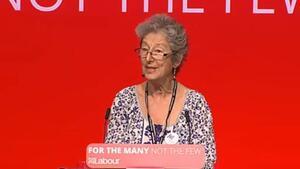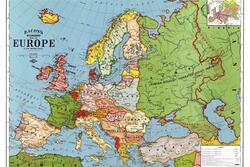The Weaponization of Antisemitism: Naomi Wimborne-Idrissi's Suspension from the UK Labour Party
In recent years, there has been much talk about antisemitism on the left, both among progressive members of the Democratic Party in the United States and within the UK Labour Party. In Britain, the ongoing issue of antisemitism has been particularly fraught. The former Labour leader Jeremy Corbyn was controversially suspended from the party in October (though he has since been reinstated in a limited capacity), after issuing a statement that the scale of the party’s antisemitism crisis has been “overstated for political reasons” by Labour’s opponents “inside and outside the party, as well as much of the media.” Corbyn’s suspension, and the wave of local party suspensions that have followed it, form part of Labour’s move to tackle antisemitism in the party.
The latest development was the December 4 suspension of Jewish socialist Naomi Wimborne-Idrissi from the party, for her conduct at an online constituency meeting. During the local party meeting, the Jewish Voice for Labour co-founder criticized the “unjust” suspension of other left-wing party members over accusations of antisemitism by the new party leadership, including her ally Corbyn. She also opposed Labour’s ban on party discussions of the EHRC report findings, which were recently implemented—again by the new leadership—to “protect” its Jewish members. Yet the pending investigation into Wimborne-Idrissi’s “antisemitic” behaviour demonstrates how the discourse of antisemitism is weaponized to marginalize Jews on the left and force the party to the center. Jewish activist Simone Zimmerman argued in a 2019 forum on Israel that “Antisemitism on the left hurts the left and our political agenda. Antisemitism fuels the right.” The disciplinary measures that have been taken by Labour against Wimborne-Idrissi are further proof of this.
Under the guise of taking a stand against antisemitic sentiment within the Labour Party, accusations of antisemitism are increasingly instrumentalized by politicians and the mainstream media in the UK when it is politically convenient for them to do so. For mainstream media outlets like the BBC, which is intended to be politically unbiased, antisemitism is often linked to the demonization of Corbyn and has served to cover-up bigoted Tory officials and to perpetuate conservative values more broadly. For Labour Party politicians in the center like party leader Keir Starmer, antisemitism has become a means of curbing socialism and purging unwanted leftists from the party. Since eliminating antisemitism is objectively seen as a good thing, these politically motivated strategies make it difficult for those on the receiving end, including left-wing Jews, to defend themselves.
This strategy has several worrying consequences for Jews, but most significantly, it undermines the fight against rising white nationalism in the UK, and within the Labour Party itself. During a national radio program on December 14, for instance, Keir Starmer failed to voice opposition to white supremacy when a caller complained about British soccer players taking the knee in solidarity with Black Lives Matter. The caller—revealed by Twitter account Red Flare to be far-right activist Jody Swingler—said that "the racial inequality is now against the Indigenous people of Britain" who are set to become "a minority by 2066." Starmer’s refusal to call out white nationalism legitimizes racism, and sends a dangerous message that far-right activity will be tolerated by the Labour Party.
The BBC’s portrayal of the Jewish left in its coverage of Corbyn’s nineteen-day suspension from the Labour Party is a useful example of wielding antisemitism for political gain in practice. After inviting Jewish activist Barnaby Raine onto its program to talk about antisemitism in October, the first question directed to Raine was whether he thought those who joined Labour under a wave of “Corbyn mania” would choose to leave the party due to his suspension. In his response, Raine states that he finds it “extremely telling and depressing that we are already talking about the mechanics of the Labour Party and not about antisemitism” in a "deeply racist country with antisemitism overflowing across British society."
He also criticizes the BBC for having the Labour Member of Parliament Margaret Hodge on the program as “a credible commentator on bigotry,” when she was applauded by the British National Party for racist remarks she made in 2007 about migrant families in the UK. Raine’s response demonstrates how the BBC’s strategic focus on Corbyn’s legacy and factional divisions within the party actively prevents urgent conversations about the increasing levels of racism in the UK from taking place.
In a recent video interview, Wimborne-Idrissi points out that such mainstream attempts to exclude left-wing Jewish voices while paying lip service to antisemitism not only disregard the perspectives of Jewish activists, but of leading Jewish scholars working on antisemitism. This has even been the case with the director of the Bard Center for the Study of Hate Kenneth Stern, Wimborne-Idrissi argues, whose own working definition of antisemitism has been weaponized by some on the right.
Another dangerous consequence of using antisemitism to sideline leftist Jews is that it threatens the right to freedom of expression, particularly in relation to anti-Zionism. Although the conflation of Judaism with Zionism is hugely problematic, contemporary antisemitism has increasingly become equated with criticism of Israel, and this so-called “new antisemitism” has been exploited by Labour as a means of silencing voices on the left. For many Jews on Labour’s left, the party’s attempts to stifle criticism of Israel is tantamount to the suppression of free speech, in which members who are vocal about the occupation are censored and rooted out from the party. However, these efforts, which routinely take place while explicitly bigoted views within the Labour Party go unchallenged, have also taken the form of direct discrimination and harassment. In the video above, Wimborne-Idrissi talks about the abuse she has received for her opinions on Palestine, including instances in which she was accused of being a “self-hating Jew,” an “antisemite,” and even a “Kapo” by some pro-Israel activists.
These kinds of accusations are paradoxical in that they represent a particularly sinister form of antisemitism in which the personal histories and identities of Jews are called into question—and in some cases are denied entirely—based on their politics. Wimborne-Idrissi is a third-generation Holocaust survivor herself, and calling her an antisemite or Kapo, the name given to Nazi camp prisoners forced to supervise inmates during the Holocaust years, is particularly offensive. “To be called an antisemite is as low as it gets,” Wimborne-Idrissi commented.
These attacks on Wimborne-Idrissi for her pro-Palestinian advocacy not only damage the movement for Israeli-Palestinian peace, but also overlook the prominent history of anti-Zionist Jewish movements from the 1930s and 40s onwards. According to Benjamin Balthaser, Zionism was unpopular among many American as well as European Jews before the 1940s, who shared an established culture of considering their place in the world as a “historically persecuted ethno-cultural diasporic minority.” He argues that even after the “scope of the Holocaust was widely understood,” the “official position” of the Jewish left was “still anti-Zionist.”
Explaining this complicated history further, Balthaser argues that in the aftermath of WWII, the Jewish left “may have called for Jews to be allowed to resettle in the lands from which they were expelled or massacred, with full rights and full citizenship, be allowed to immigrate to the United States, or even be allowed to emigrate to Palestine if there was nowhere else to go (as was often the case). But they were still wholly against partition and the establishment of a Jewish-only state.”
Wimborne-Idrissi similarly locates anti-Zionism firmly within Jewish tradition, and in particular with the notion of identifying and acting in solidarity with the oppressed and not the oppressor. Balthaser affirms this idea, arguing that the “history of the anti-Zionist Jewish left demonstrates that an important historical role in a diaspora has been solidarity with other oppressed people. That’s the place from which we’ve gathered the most strength, historically.”
As with many other religions, Judaism has different branches comprising Jews with widely differing opinions. Protecting the rights of Jews across the political spectrum is central to both achieving a socially democratic society and to the ideology of the Labour Party. To achieve this, it is crucial to recognize when political parties overstep their role and construct barriers to democracy for political ends. As Wimborne-Idrissi argues, Labour is not a “leading authority” on antisemitism.







We met Naomi in Trafalgar Square some time ago and then used to see her on tv occasionally when she was putting the views, we share, that are now considered to be “antisemitic” because she deplores the way Palestinians are treated in Israel. Good to find this article about her.
Why is Jewish Women's Archive profiling and amplifying a woman who denies and kosherises antisemitism?Naomi Wimborne Idrissi defended Ken Livingstone's remarks and Hitler and Zionism, and claimed publicly that the "Zionists" collaborated with the Nazis. What value is there in putting such abhorrent people on your website?
This has been very interesting and enlightening to read.